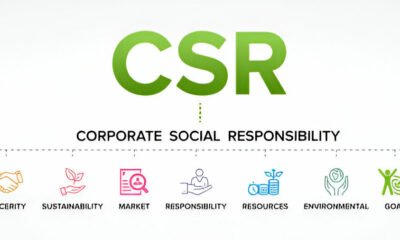

Features
Corporate social responsibility is ‘just good business’
On April 15, an event in London (which you can watch live here) will question whether corporate social responsibility (CSR) has reached its sell-by date.
Hosted and produced by Responsible 100, Be Inspired Films and Kyocera Document Solutions, the interactive panel discussion forms part of Business in the Community’s Responsible Business Week 2013.
Blue & Green Tomorrow has posed a handful of questions about CSR to each of the companies involved, ahead of April 15.
We’ve already heard the thoughts of Kyocera’s Tracey Rawling Church, Matter&Co’s Tim West, Be Inspired Film’s Ravinol Chambers, Legal & General’s Graham Precey and Vicky Murray, of Neal’s Yard Remedies and Forum for the Future.
Next up to share their views is our very own Simon Leadbetter, founder and publisher of Blue & Green Tomorrow.
What does ‘corporate social responsibility’ mean to you?
As you have several answers on what CSR is, I’ll take a different tack and say what CSR isn’t.
It isn’t simply a department or team; nor is it a marketing or communication strategy; nor is it something that can or should come very easily to profit-seeking businesses.
While CSR doesn’t necessarily require making less profit, occasionally situations will arise where the business must choose between what is socially responsible and what is most profitable. If a business consistently favours profit when push comes to shove, it is not socially responsible.
What does it mean to us? It’s a whole business discipline that includes every aspect of an enterprise’s operations; its ownership, principle activity, financials, transparency and compliance with law, communications, use of resources and treatment and behaviour of staff, suppliers, customers and engagement with communities.
This applies at an economic, social and environmental level, and means exceeding the minimum standard required by law.
With the rise in resource prices and the growth in digitally-connected, environmentally-aware and increasingly organised consumers, it’s also just good business.
Can you explain the difference, if any, between responsible business and corporate social responsibility?
The use of the word ‘corporate’ suggests that it doesn’t apply to midcaps, SMEs or non-profits. When we speak of corporations we often mean the biggest private enterprises. ‘Social’ also has all sorts of meanings, none of which necessarily apply to the environment.
The proliferation of three letter abbreviations around CSR confuses the landscape and dilutes a vital message. We have triple bottom line (TBL) in accounting; environmental, social and governance (ESG) in investment; and there’s also people, planet, profit (PPP) among many others – all with subtle but important differences.
Ethical, sustainable or responsible business seems to capture the concept in two simple words. Now we just need to settle on which one. As I did above, defining something by what it is not sometimes helps. These are not unethical, unsustainable and irresponsible businesses. We won’t suggest the ‘Not Irresponsible 100’.
How widespread/mainstream is corporate social responsibility, in the sense you describe, and do you have any best-in-class examples?
I think CSR is quite widespread in theory, but narrow in practice.
Existing corporate charity work or efficiency programmes undertaken to cut costs are often badged as CSR initiatives, so that companies who operate in otherwise irresponsible ways can claim CSR activity, regardless of the externalities of their business activity, e.g. the arms or tobacco trade.
Best-in-class would probably be the John Lewis Partnership and Co-operative on a large scale – although they often fall short of their own high standards.
On a smaller scale, Triodos, Ecology Building Society, Charity Bank, Good Energy and several tour operators we’ve spoken to spring immediately to mind.
Anyone who participates in the Responsible 100 needs a pretty clean CSR bill of health due to the rigour of the questionnaire that sits behind it.
Without stealing the event’s thunder, has ‘corporate social responsibility’ passed its sell-by date? And why do you say that?
This is a fudged response but ‘probably’ or ‘almost’.
It’s slid into overuse and misuse among an increasingly sceptical audience that often hears the noble words of senior business leaders and then sees the companies they work for or buy from act irresponsibly.
What will corporate social responsibility look like in 10 years’ time?
It will still have diehard adherents, often working for irresponsible corporations, but doing their level best to minimise the harm of their employers.
You’ll always get the sceptics who just see the whole area as a waste of money or greenwash by lefty, treehugger liberals. And then you’ll have those doing really responsible and profitable stuff, not necessarily under the badge of CSR. It will be just the way they work – maximising good.
In 10 years’ time, the problems caused by irresponsible business will be more pronounced so the concept and practice, if not the badge, will be more commonplace.
Further reading:
‘CSR is an inadequate response to the scale of global challenges we face’
CSR is about ‘having mechanisms to fix market inequalities or injustices’
‘We need to go deeper with corporate social responsibility’
Some corporate social responsibility has ‘gone stale’


 Environment12 months ago
Environment12 months agoAre Polymer Banknotes: an Eco-Friendly Trend or a Groundswell?

 Features11 months ago
Features11 months agoEco-Friendly Cryptocurrencies: Sustainable Investment Choices

 Features12 months ago
Features12 months agoEco-Friendly Crypto Traders Must Find the Right Exchange

 Energy11 months ago
Energy11 months agoThe Growing Role of Solar Panels in Ireland’s Energy Future





























